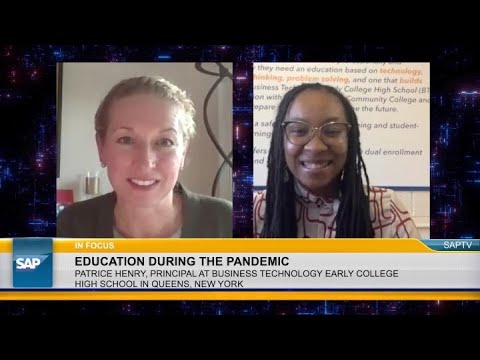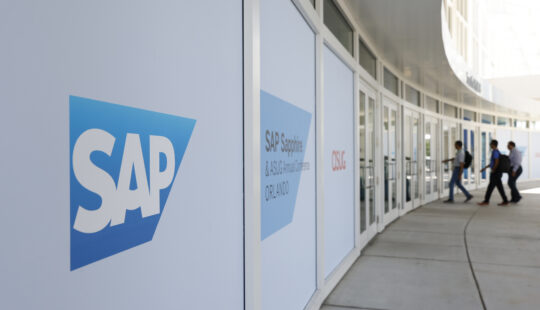It’s 10:15 a.m. on a Tuesday and the class bell still rings at Business Technology Early College High School (BTECH) in Queens, New York. The stentorian tone briefly fills the atmosphere and reverberates through the halls, a conspicuous reminder that we are in a school, although by virtual presence.
Principal Patrice Henry is detailing the support measures the school staff provides to ensure that the students have access to a safe, modern learning environment, where they can master twenty-first century skills for competitive careers in the digital economy. For schools everywhere, this has been an extremely difficult year.
“There’s a lot more trauma than we’ve ever had in our history. We’re very mindful of that,” Ms. Henry says. “We just try to create a really strong community. We’re looking for all these indicators of student performance. If students are falling low in any of those categories, then we have to go into different tiers of support.”
With the exception of the class bell, the school hallways are quiet today. The 550 students of BTECH are at home, learning remotely – a consequence of the COVID-19 pandemic that has disrupted education worldwide. Despite the turmoil the pandemic has brought to New York City, Ms. Henry and the school’s staff remain steadfastly dedicated to the school’s mission of “combining academic excellence with technical aptitude, thus empowering students to be successful in our modern, information-based global economy and community.”

BTECH is a New York City public high school for grades 9-14. Working with SAP and Queensborough Community College, the school provides a supportive and academically challenging learning environment for traditionally underserved students of high potential. Founded in 2014, the school achieves a 98.1 percent graduation rate. Students have the opportunity to earn valuable IT skills certifications in Amazon AWS Cloud and Microsoft Office during their studies. Of the 115 graduates from the program each year, 90 percent continue their educations at either two-year or four-year colleges in the New York City area, while 10 percent choose to enter the labor force or military service.
SAP Supports Early College High Schools
As New York City went into lockdown last spring, BTECH, like most schools, shifted to online learning overnight. To ensure that no student was shut out from an opportunity to learn, educators at BTECH continued to closely monitor student attendance and participation in daily, live, interactive class sessions.
One indicator of student performance quickly drew Ms. Henry’s attention: Many of the students lacked reliable devices to log on to virtual classrooms and keep up with their schoolwork. In fact, a large number of students were struggling to maintain connectivity with mobile phones or unreliable devices that lacked the necessary capabilities for advanced coursework in a technology-focused study program. Many families in the community had suffered a loss of income from job furloughs or layoffs and were not in a position financially to afford a new device for their student.
As an industry partner for BTECH, SAP stepped up to provide each student with a Chromebook or tablet so the pandemic wouldn’t have to mean a lost year of education for any student. Katie Booth, SAP Corporate Social Responsibility lead for North America, says, “It is essential that during this time we support needs that are central to students’ learning. At SAP, we trust that school leaders know what is needed, so this year we’ve partnered with them to find ways to meet those needs, even if they’re outside the normal scope of our support.”
SAP supports four high schools with early college elements and a focus on project-based learning in North America, including BTECH; C-Town Tech in Boston, Massachusetts; Templeton Secondary School in Vancouver, British Columbia; and Skyline High School’s Computer Science and Technology Academy in Oakland, California. SAP supports the schools through technical guidance and assistance, financial support, as well as student development opportunities through mentorship, SAP office visits, and soft skills training.
Staying Connected at Oakland’s Skyline High School
In Oakland, California, the students and teachers at Skyline High School’s Computer Science and Technology Academy faced similar challenges due to the COVID-19 pandemic. The school’s staff, who were forced to teach in an online learning format in mid-March, have had to navigate complex challenges that are social, educational, and technological.
“The top priority is to keep kids engaged and make sure no one slips through the cracks right now,” says Mark Frey, director and multimedia teacher at Skyline High School’s Computer Science and Technology Academy. “We have a pretty elaborate support system in place, with a counselor, case manager, and assistant principal. We want to keep kids connected, so they don’t drift off. We’re also trying to maintain a quality educational environment, where the kids are continuing to learn.”
Through resourcefulness and some clever engineering, Frey and his fellow teachers have implemented a technology solution to keep students connected to the school’s computers to do their course work. Called Guacamole, the free and open-source software from Apache ensures that students like Ravynne, a third-year student in the program with a passion for digital filmmaking, can connect to the school computers to work on projects for her multimedia class. She says the connection is stable enough that it has allowed her to gain valuable experience editing with Adobe Premiere Pro and that she is very grateful to the Skyline High School community for the opportunity to work with this powerful software suite.
Listen to the audio clips to hear Frey describe how Guacamole bridges the connectivity gap for students at Skyline High School’s Computer Science and Technology Academy.
Skyline High School’s Computer Science and Technology Academy
The six-year early college high school program at Skyline High School in Oakland, California, provides valuable STEM education and training for careers in the digital economy. The program is a deep partnership with Oakland Unified School District (OUSD), Berkeley City College (BCC), the Career Ladders Project, and SAP. Students acquire technical skills and professional certifications, plus have access to SAP employee mentors and workplace learning opportunities. In addition to a high school diploma, students can earn a technology-focused associate degree from BCC free of charge.
Closing the Opportunity Gap
Adolescence is an extremely important time for both educational and social development, as underscored by the National Institutes of Health in its strategies to support high school students’ mental health during the pandemic. Traditionally, schools have provided a safe, secure environment for adolescents to explore new concepts and learn through interpersonal social interactions with a wide variety of people. With the school closures, cancellations of youth activities, and social distancing brought on by the pandemic, many students have had to develop a high level of resilience and self-reliance to get through this challenging time.
Some students, like Ravynne, find inspiration in role models at home. Ravynne says that her mother and sister motivate her to do her best at school and aim high for the future. Not surprisingly, this high schooler has developed sound habits that will prepare her for success. “The first thing I like to do is just write down a list of things that I need to get done throughout the day. Even if I don’t finish everything, that’s fine, but I’ll try to get at least half done. That’s mainly how I’m staying organized,” Ravynne says. “When I’m studying, I like to go to a quiet place. My room is fine, but sometimes I will go outside and sit in my backyard.”
However, many students at the schools that make up the SAP Early College High School initiative have less secure support structures or home environments that have been deeply affected by the pandemic. These students are especially vulnerable to pressures that can derail their studies and affect their opportunities.
Frey describes some of the challenges that teachers face in trying to engage students through distance learning in an educational environment shaped by COVID-19.
Graduates Face Tough Decisions in an Unusual Year
At BTECH, Ms. Henry looks forward to the day the students will return to their classrooms and the hum of activity will fill the halls once again. In a virtual open forum event called “Ask Me Anything,” many of the questions she fielded from students reflected their desire to reconnect with peers and find fellowship in the school’s robust offering of afternoon activities.
She knows that many of the students are facing difficult decisions about whether to continue their education after graduation or go directly into the workforce to help ease the financial strain on their families. Referencing statistics for the 2020 graduating class, she says, “Ninety percent of them went directly to college. I’m not sure that’s going to be the case this year. I’m actually curious myself about what our numbers will look like, given the challenges that we’re having as a nation and definitely as New Yorkers.”
This article first appeared on the SAP Global News Center



